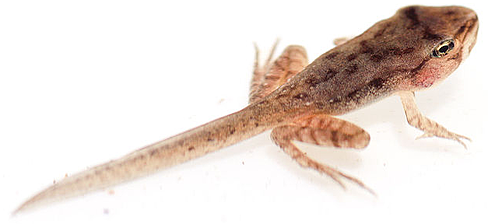In a potentially dangerous situation, many animals release stress hormones into the body to prepare the animal for raw survival. Sometimes these evoke defense mechanisms and sometimes they assist in fleeing from danger, hence the idea of a “fight or flight” response. Now, research at the University of Michigan, Ann Arbor shows that tadpoles instead choose a third option: physical transformation.
 Tadpoles are no strangers to transformation; after all, they do grow legs and lungs in order to leave the water as frogs. But they can also alter their body before they mature in response to dangerous situations, like predator attacks. For the Ann Arbor researchers, the next puzzle was the process by which the tadpoles actually began the physical alteration. With this goal in mind, they ran a series of experiments to better understand the tadpole lifestyle.
Tadpoles are no strangers to transformation; after all, they do grow legs and lungs in order to leave the water as frogs. But they can also alter their body before they mature in response to dangerous situations, like predator attacks. For the Ann Arbor researchers, the next puzzle was the process by which the tadpoles actually began the physical alteration. With this goal in mind, they ran a series of experiments to better understand the tadpole lifestyle.
First, the tadpoles were exposed to dragonfly larvae, which prey on tadpoles in the wild. The terrified polliwogs released pheromones, which alerted other tadpoles to the impending mortal danger. The tadpoles exposed to pheromones for several days showed increased levels of corticosterone, the tadpole equivalent of a stress hormone. This isn’t a surprising result, as the constant threat of a deadly predator over multiple days is sure to stress out even the most composed tadpole. However, in the next test, the researchers found that exposing tadpoles to corticosterone caused their tails to elongate in a matter of days.
To verify this result, tadpole tails were added to a petri dish with corticosterone. The tails grew larger at the same rate, confirming the validity of the result while also revealing that it was the tails themselves that respond to the stress hormone. This is a counterintuitive phenomenon, considering organisms usually function worse under stress. As UM researcher John Denver (who is a professor in molecular, cellular, developmental, and evolutionary biology) puts it in a recent UM article,
"The action of the stress hormone on the tail to cause it to grow was unexpected because in adult vertebrates, including humans, prolonged exposure to stress hormones typically inhibits the growth of tissues…In humans, chronic stress causes muscle wasting."
Putting the differences in stress response between organisms aside, the growth of larger tails would be meaningless if it didn’t do anything to help the tadpoles out. Thus one final test was called for; namely, releasing the aforementioned dragonfly larvae and comparing survival rates. As expected, the tadpoles with larger tails fared much better against the predator attack.

(Wood frog images courtesy of Wikimedia Commons and Brian Gratwicke)
To sum up, tadpoles that get stressed by predation risk develop larger tails to better survive such a danger, all in a matter of days. The results of this study can be used to better understand immediate evolutionary responses to stressors and the positive effects of stress on the body, of which this is the first example. This study was funded by the U-M Department of Ecology and Evolutionary Biology and by several grants from the U.S. National Science Foundation. To read more about research funding at the University of Michigan, click the button below:
Biotechnology Calendar, Inc. will be returning to the University of Michigan in July 2013 for its Ann Arbor BioResearch Product Faire™ on July 18th, 2013. Biotechnology Calendar is a full service event company that has produced on-campus, life science research trade shows nationwide for the past 20 years. We plan and promote each event to bring the best products and services to the finest research campuses across the country. If you are a university researcher or a laboratory product vendor, consider attending one of our on-campus trade shows: here is our 2013 schedule.



